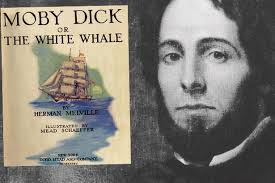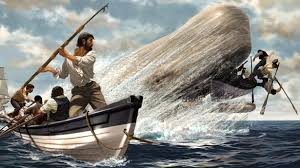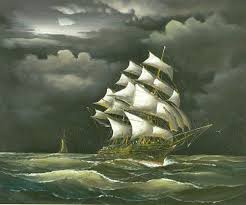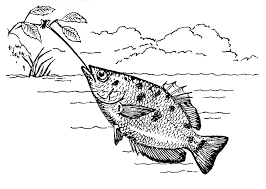 Three decades after reading, in the original English, Herman Melville’s famous novel about Captain Ahab’s mad quest for a Great White Whale (and about so much else besides!), I have lately been enjoying the exercise of re-reading it in José María Valverde’s Spanish-language translation. I had chanced on the paperback some time ago at some library book sale or other—who can remember how many years ago? Or perhaps it was in Bloomington at Caveat Emptor, my favorite used-book store? I picked it up, anyway, and said to myself something like, Why not? And much more recently, with no less randomness, casting about for something new to read in my second language and stumbling on this long-neglected treasure, I said something like, Why not NOW?
Three decades after reading, in the original English, Herman Melville’s famous novel about Captain Ahab’s mad quest for a Great White Whale (and about so much else besides!), I have lately been enjoying the exercise of re-reading it in José María Valverde’s Spanish-language translation. I had chanced on the paperback some time ago at some library book sale or other—who can remember how many years ago? Or perhaps it was in Bloomington at Caveat Emptor, my favorite used-book store? I picked it up, anyway, and said to myself something like, Why not? And much more recently, with no less randomness, casting about for something new to read in my second language and stumbling on this long-neglected treasure, I said something like, Why not NOW?
So here we are. I turn to the English text as retrieved from Wikisource, to an extended passage from chapter 89 of Melville’s classic—a pause in the narrative cycle so that our encyclopedian Ishmael can elaborate on maritime legal concepts regarding the capture and possession of whales or other large, fishy creatures.
The established legal principle was this: “‘a fast-fish belongs to the party fast to it’”; and, “‘a loose fish is fair game for anybody who can soonest catch it.’” The question, then, comes down to the difference of definition between a “fast-fish” and a “loose-fish” (pez sujeto and pez libre, in the Spanish, which might also be rendered captured, bound, or subjugated fish and free, escaped, or fleeing fish). The reader can imagine how interpretation and application might vary in the mind of plaintiff, defendant, or judge—and by means of the socioeconomic and political lenses of the interpreter.
 “First: What is a Fast-Fish?” Ishmael / Melville asks? “Alive or dead,” they answer, “a fish is technically fast, when it is connected with an occupied ship or boat, by any medium at all controllable by the occupant or occupants,—a mast, an oar, a nine-inch cable, a telegraph wire, or a strand of cobweb, it is all the same.” Or, technically speaking, it remains captured or subjugated as long as it bears some “recognized symbol of possession” and the party fishing or pursuing it is in a position and showing intention to take a more permanent hold of it.
“First: What is a Fast-Fish?” Ishmael / Melville asks? “Alive or dead,” they answer, “a fish is technically fast, when it is connected with an occupied ship or boat, by any medium at all controllable by the occupant or occupants,—a mast, an oar, a nine-inch cable, a telegraph wire, or a strand of cobweb, it is all the same.” Or, technically speaking, it remains captured or subjugated as long as it bears some “recognized symbol of possession” and the party fishing or pursuing it is in a position and showing intention to take a more permanent hold of it.
Ishmael then relates a judicial case (some fifty years old at the time of telling, he parenthesizes) of aggrieved whalers who, having first succeeded in harpooning their prey, “were at last, through peril of their lives, obliged to forsake not only their lines, but their boat itself”; and of another ship’s crew who took it out from under them and, on top of that, at once taunted them and kept their “line, harpoons, and boat, which had remained attached to the whale at the time of the seizure.”
Which leads to a highly questionable, even regrettable analogy that places a husband in the position of accusing whalers and his divorced wife in that of their escaped fish; and, though the comparison be obnoxious in the highest degree, let’s put aside our twenty-first century moral disgust at the chauvinist’s choice of words and image (and such arguments as Mary Wollstonecraft might have made, at that crossroads between eighteenth and nineteenth centuries, in vindication of the insulted woman’s dignity) in order to get at the substance of the argument itself.
 It seems that a “gentleman,” in the defense attorney’s analogy, “after in vain trying to bridle his wife’s viciousness” (ungovernableness, perhaps? unruliness or independent-mindedness?) “had at last abandoned her upon the seas of life”; but afterwards, “repenting of that step, he instituted an action to recover possession of her”; all well and good, the lawyer argued, the gentleman having abandoned her only under great stress and because of her own nastiness, as Candidate Trump might have had in mind when he insulted Candidate Hillary (the two terms, viciousness and nastiness, oddly connected, in etymological terms)—all good and well, the lawyer said, “yet abandon her he did, so that she became a loose-fish; and therefore when a subsequent gentleman re-harpooned her, the lady then became that subsequent gentleman’s property, along with whatever harpoon might have been found sticking in her.”
It seems that a “gentleman,” in the defense attorney’s analogy, “after in vain trying to bridle his wife’s viciousness” (ungovernableness, perhaps? unruliness or independent-mindedness?) “had at last abandoned her upon the seas of life”; but afterwards, “repenting of that step, he instituted an action to recover possession of her”; all well and good, the lawyer argued, the gentleman having abandoned her only under great stress and because of her own nastiness, as Candidate Trump might have had in mind when he insulted Candidate Hillary (the two terms, viciousness and nastiness, oddly connected, in etymological terms)—all good and well, the lawyer said, “yet abandon her he did, so that she became a loose-fish; and therefore when a subsequent gentleman re-harpooned her, the lady then became that subsequent gentleman’s property, along with whatever harpoon might have been found sticking in her.”
Again, setting aside the unpleasantness of both thought and image, let’s move on to the judge who has clearly taken the point “that the examples of the whale and the lady were reciprocally illustrative of each other.” In which case he felt compelled to lay out these terms: “to wit,—That as for the boat, he awarded it to the plaintiffs, because they had merely abandoned it to save their lives; but that with regard to the controverted whale, harpoons, and line, they belonged to the defendants; the whale, because it was a Loose-Fish at the time of the final capture; and the harpoons and line because when the fish made off with them, it (the fish) acquired a property in those articles; and hence anybody who afterwards took the fish had a right to them. Now the defendants afterwards took the fish; ergo, the aforesaid articles were theirs.”
While a reasonable man might disagree with both sexist analogy and esteemed judge’s ruling, Ishmael contends that in these two laws “will on reflection, be found the fundamentals of all human jurisprudence”; and he proceeds from there to the heart of the matter, which is the commentary that justifies the original digression from Melville’s principal fictive narration:
 “Is it not a saying in everyone’s mouth,” Ishmael asks, verily dripping with Melville’s intentional ironies, that
“Is it not a saying in everyone’s mouth,” Ishmael asks, verily dripping with Melville’s intentional ironies, that
Possession is half the law: that is, regardless of how the thing came into possession? But often possession is the whole law. What are the sinews and souls of Russian serfs and Republican slaves but Fast-Fish, whereof possession is the whole of the law? What to the rapacious landlord is the widow’s last mite but a Fast-Fish? […] What is the ruinous discount which Mordecai, the broker, gets from the poor Woebegone, the bankrupt, on a loan to keep Woebegone’s family from starvation; what is that ruinous discount but a Fast-Fish? What is the Archbishop of Savesoul’s income of 100,000 pounds seized from the scant bread and cheese of hundreds of thousands of broken-backed laborers (all sure of heaven without any of Savesoul’s help) what is that globular 100,000 but a Fast-Fish? […] And concerning all these, is not Possession the whole of the law?
But if the doctrine of Fast-Fish be pretty generally applicable, the kindred doctrine of Loose-Fish is still more widely so. That is internationally and universally applicable.
What was America in 1492 but a Loose-Fish, in which Columbus struck the Spanish standard by way of wailing it for his royal master and mistress? What was Poland to the Czar? What Greece to the Turk? What India to England? What at last will Mexico be to the United States? All Loose-Fish.
What are the Rights of Man and the Liberties of the World but Loose-Fish? What all men’s minds and opinions but Loose-Fish? What is the principle of religious belief in them but a Loose-Fish? What to the ostentatious smuggling verbalists are the thoughts of thinkers but Loose-Fish? What is the great globe itself but a Loose-Fish? And what are you, reader, but a Loose-Fish and a Fast-Fish, too?
#
 Arriving again at these last and cogent lines—such fitting interrogative and exclamation points at the end of Melville’s chapter—I do so with a strong impression of having just dreamt them. For here we all stand, bewildered and divided citizens and humanity after the first month since the inauguration of an American President whose election I lamented at last writing for this blog. For, while history does not precisely repeat itself, its echoes and reiterated patterns are always present, instructive like the parables of Jesus to those with ears to hear.
Arriving again at these last and cogent lines—such fitting interrogative and exclamation points at the end of Melville’s chapter—I do so with a strong impression of having just dreamt them. For here we all stand, bewildered and divided citizens and humanity after the first month since the inauguration of an American President whose election I lamented at last writing for this blog. For, while history does not precisely repeat itself, its echoes and reiterated patterns are always present, instructive like the parables of Jesus to those with ears to hear.
I do not want to belabor the issue; you, my readers, can make your own associations between the biting sarcasm of Herman Melville’s literary critique of the predatory nature of human history from whose nightmare James Joyce’s young artist, Stephen Dedalus, so famously was trying to awake.
As for myself, in these times of dark national affliction, I have been unable to pass a day without a piercing and sorrowful consciousness of some of the fast and at least temporarily loose fish within the aim of the new president’s or any one of his harpoonists’ aim. And trying to strike the right balance between political resistance and activism and the more particular labors of my literary profession.
Primarily, I have been writing a monthly column for the new Hoosier newsletter Progressive Indiana; and, more irregularly, my letters or commentary might appear in Evansville, Indiana’s daily Courier & Press or, more frequently, in the twice-weekly local Perry County News. These things, accomplished not without some creative and emotional anguish, are natural enough to my twin vocations of writing and teaching; and, I consider, a part of my civic responsibility. Likewise with these essays and others, as well as my fiction and literary translations which inevitably bear a moral or ethical or social and political texture.
Originally I thought of my literary intention as a priestly vocation, though by now only in a metaphorical sense, unbound by creed or doctrine but planted within a common terrestrial soil that contains both the gritty reality of Darwinian evolution and the more transcendent and mysterious realities of humanity’s more religious or spiritual (or philosophical or ethical) aspirations. Perhaps a better word—and more flexible than priestly—might be prophetic, which can be applied as comfortably to fantasy or science fiction that allows us to see true patterns of what has been in the world and what might yet come to be. Sometimes, in fact, the most prophetic work is what has the potential (for those with ears to hear) to reveal what we as a people are, by the reflection of what humanity has already been or might yet become.
This may be true of any artistic form, though I speak here in terms of the written and spoken word. In the realm of political and social resistance, which is also Constitutionally protected speech, certainly the ideal is to meet each other in a state of shared inquiry and dialogue that is at once civil and civic.
Louis Menand, in the excellent historical narrative and analysis in his book The Metaphysical Club, writes about the American Pragmatists (not metaphysicians at all, really, the title deliberately ironic, though William James did write with particular intelligence of religious experience) who, after the horror and bloodshed of the Civil War, sought a philosophy that would help us transcend the dangers of absolute certitude that lend no space to such civic virtues as tolerance and compromise. They had lost confidence in the American Transcendentalism of their most immediate philosophical forebears, most famously Emerson and Thoreau, who were so drawn to the radical abolitionist and religious fervor of John Brown of the bloody rebellion against that “peculiar institution” of Southern slavery. The novelist Marilynne Robinson, particularly in the first two volumes of her Gilead trilogy, deals elegantly and perceptively with that history of Bleeding Kansas and its aftermath in the Civil Rights era of the Fifties and Sixties.
Should the Civil War have not been fought, then? The lessons of history are nothing if not ambiguous and contradictory. “Do I contradict myself?” the Transcendentalist poet Walt Whitman asks? “Very well then I contradict myself. (I am large, I contain multitudes.)” Emerson himself concurred: “A foolish consistency is the hobgoblin of little minds, adored by little statesmen and philosophers and divines.”
Thoreau himself, for all his praise of John Brown of the raid on Harper’s Ferry, was no friend of war; the Henry David Thoreau who went to jail rather than pay his war tax in protest of the United States’s imperialist Mexican War—which led to his essay (“On the Duty of Civil Disobedience”) that inspired the Mahatma Gandhi’s nonviolent protests that ended up defeating the British Empire, and which in turn inspired the transcendent campaigns and rhetoric of Martin Luther King, Jr. Melville, too, who in the above-cited passage alludes to that campaign to seize Mexican territory in the name of Manifest Destiny, was heavily influenced by Emerson’s Transcendentalism; and in Moby Dick, with his (or Ishmael’s) investigation of the darkness as well as the light within the human soul, may have arrived closer than Emerson could to the Pragmatists’ loathing of that dark underside of the soul, which has led humanity to the fratricidal bloodshed of un-civil war from ours a century and a half ago to Syria’s today.
Whitman, too, who in the course of his war poems in Drum-Taps (included in the ever-expanding volume Leaves of Grass) loses, over the grinding dreary crush of Lincoln’s war, much of his initially fervent idealism at the great cause. Among the hymns to heroic Lincoln that follow, I have loved “O Captain! My Captain!” and taught it with some success to elucidate the concept of the paradox: the nation’s simultaneous relief at war’s end and grief at the loss of their beloved president.
 Contradiction and ambiguity, then: paradox. To the momentous and haunting question posed above, there are no simple answers; the only thing we know for sure is the weight of the suffering on both sides. It is harder to determine whether the Emancipation was worth the price of so much misery, but then, how does one measure the weight of two centuries of suffering beneath the whips of oppression and four years of travail in order to end that particular evil? And yet, even so, the freedom won was as quickly lost to the tyranny of Jim Crow. The wounds that too many of us thought healed with the signing of the Voting Rights Act—for all the apparent progress made—still lie open, festering beneath the perceived permission of white supremacists both Southern and Northern to rise up again in defense of their racial and historical privilege. Here we are half a century later, re-visiting the same battles.
Contradiction and ambiguity, then: paradox. To the momentous and haunting question posed above, there are no simple answers; the only thing we know for sure is the weight of the suffering on both sides. It is harder to determine whether the Emancipation was worth the price of so much misery, but then, how does one measure the weight of two centuries of suffering beneath the whips of oppression and four years of travail in order to end that particular evil? And yet, even so, the freedom won was as quickly lost to the tyranny of Jim Crow. The wounds that too many of us thought healed with the signing of the Voting Rights Act—for all the apparent progress made—still lie open, festering beneath the perceived permission of white supremacists both Southern and Northern to rise up again in defense of their racial and historical privilege. Here we are half a century later, re-visiting the same battles.
Whatever imperfection, then, that may exist in the Pragmatists’ philosophy of conciliation and reasoned agreement, they were certainly prophetic in terms of the apocalyptic choices that are thrust on us today by the hawks, both Republican and Democratic, who continue to stir up seemingly endless war—if not with ISIS or Al-Qaeda, then with Iran or Russia or China, as if the option of diplomacy and peacemaking were not even remotely (or even humanly) possible. So for every dollar spent for growing the already bloated war machine, we’ll cut two from the arts and humanities; just as two regulations for every new one, for every billion dollars added, two cut—from climate science, from guaranteed healthcare and other social programs, from everything, in short, that might really make the homeland more secure, less paranoid, and even bequeath to our own and future generations a livable planet.
Without belaboring the point and while acknowledging that the present Administration is only the culmination of a process that has been underway for decades, aided by a rising and un-compromising Republican extremism and abetted by a Democratic establishment that has thrown little more than hollow symbolism at their popular base, I cannot escape the nightmare image of all the fast and loose fish at the mercy of a terrifying, merciless, punitive regime that to my mind promises only heartbreak and sorrow. So I am heartened by the continual resistance, which will do all it can to deny the president and his self-acknowledged wrecking crew the chance to disassemble the basic structure of our democratic republic.
What I was coming to, anyway, before drifting into this by no means impertinent digression, was my personal struggle to achieve a workable balance between the urge to be a part of that resistance and the calling that I have always felt is mine: the literary vocation. As the former concern begins to swallow the latter, which if I am not careful seems likely to drown itself in the continually escalating series of political shocks, news, and analysis to be processed and devoured, it occurs to me that my contributions as a writer, literary translator, and occasional editorialist—however obscure and invisible—really are the central task that I must attend to. My enjoyment and production of literature has always been, after all, my strength and my resistance against the madness that I continue to encounter in this world.
By the way, if anyone reading this is interested in receiving free copies of the monthly Progressive Indiana, let me know or contact the editor at guy@guytownsend.net or at 9609 Wolf Creek Dr., Lexington, IN, 47138. The project exists primarily to facilitate the coming together in the state of the various segments of an already emerging progressivist movement, with the purpose of establishing among us—and, we hope, with honest-minded neighbors of all political orientations—the conversation and collaboration that might end up saving the very fabric of civil society.




